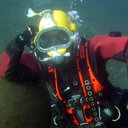Pathophysiological and diagnostic implications of cardiac biomarkers and antidiuretic hormone release in distinguishing immersion pulmonary edema from decompression sickness.
Sleutelwoorden
Abstract
Immersion pulmonary edema (IPE) is a misdiagnosed environmental illness caused by water immersion, cold, and exertion. IPE occurs typically during SCUBA diving, snorkeling, and swimming. IPE is sometimes associated with myocardial injury and/or loss of consciousness in water, which may be fatal. IPE is thought to involve hemodynamic and cardiovascular disturbances, but its pathophysiology remains largely unclear, which makes IPE prevention difficult. This observational study aimed to document IPE pathogenesis and improve diagnostic reliability, including distinguishing in some conditions IPE from decompression sickness (DCS), another diving-related disorder.Thirty-one patients (19 IPE, 12 DCS) treated at the Hyperbaric Medicine Department (Ste-Anne hospital, Toulon, France; July 2013-June 2014) were recruited into the study. Ten healthy divers were recruited as controls. We tested: (i) copeptin, a surrogate marker for antidiuretic hormone and a stress marker; (ii) ischemia-modified albumin, an ischemia/hypoxia marker; (iii) brain-natriuretic peptide (BNP), a marker of heart failure, and (iv) ultrasensitive-cardiac troponin-I (cTnI), a marker of myocardial ischemia.We found that copeptin and cardiac biomarkers were higher in IPE versus DCS and controls: (i) copeptin: 68% of IPE patients had a high level versus 25% of DCS patients (P < 0.05) (mean ± standard-deviation: IPE: 53 ± 61 pmol/L; DCS: 15 ± 17; controls: 6 ± 3; IPE versus DCS or controls: P < 0.05); (ii) ischemia-modified albumin: 68% of IPE patients had a high level versus 16% of DCS patients (P < 0.05) (IPE: 123 ± 25 arbitrary-units; DCS: 84 ± 25; controls: 94 ± 7; IPE versus DCS or controls: P < 0.05); (iii) BNP: 53% of IPE patients had a high level, DCS patients having normal values (P < 0.05) (IPE: 383 ± 394 ng/L; DCS: 37 ± 28; controls: 19 ± 15; IPE versus DCS or controls: P < 0.01); (iv) cTnI: 63% of IPE patients had a high level, DCS patients having normal values (P < 0.05) (IPE: 0.66 ± 1.50 μg/L; DCS: 0.0061 ± 0.0040; controls: 0.0090 ± 0.01; IPE versus DCS or controls: P < 0.01). The combined "BNP-cTnI" levels provided most discrimination: all IPE patients, but none of the DCS patients, had elevated levels of either/both of these markers.We propose that antidiuretic hormone acts together with a myocardial ischemic process to promote IPE. Thus, monitoring of antidiuretic hormone and cardiac biomarkers can help to make a quick and reliable diagnosis of IPE.


